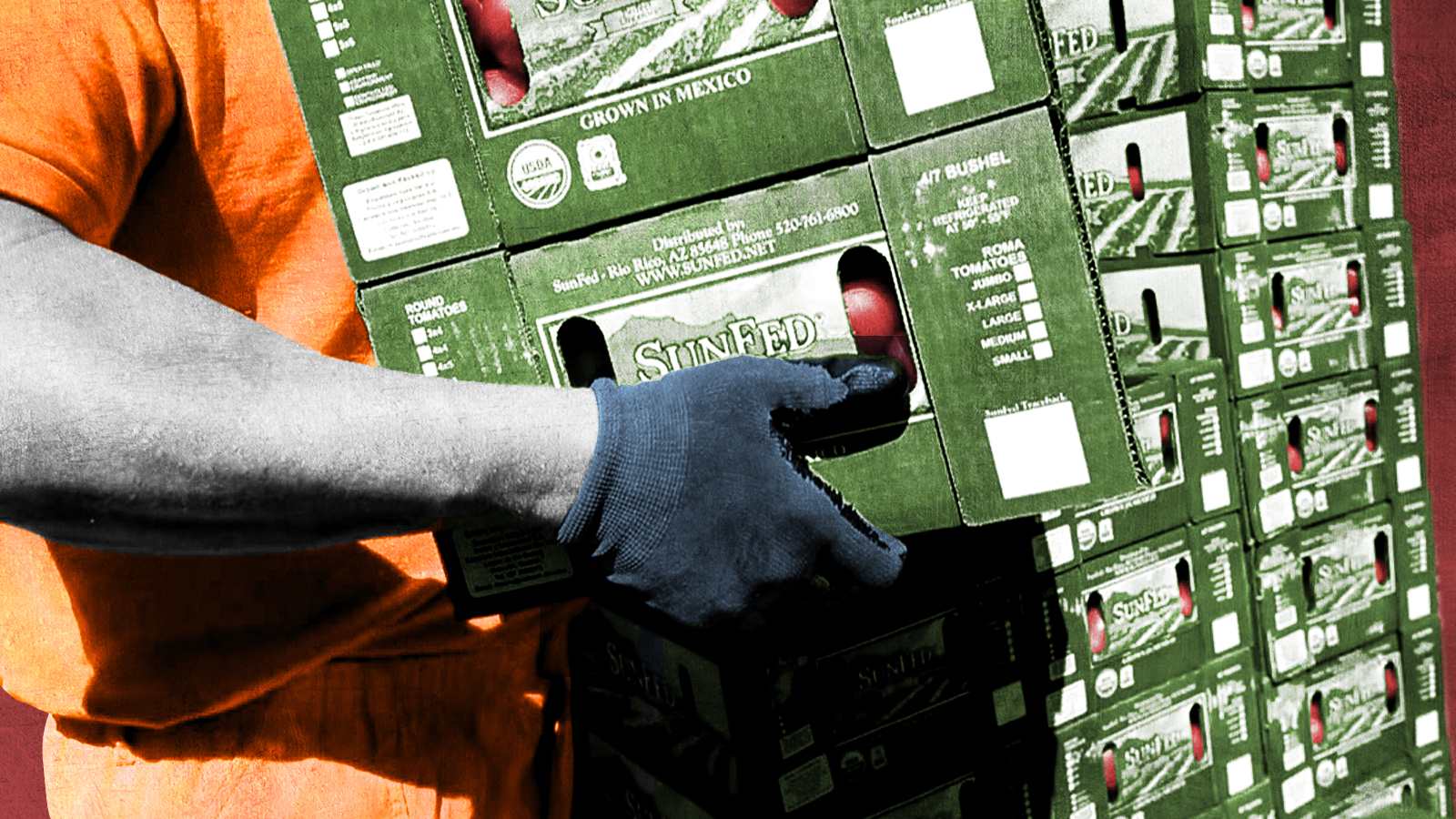How prison reform fared in the midterms
Five states voted on whether to amend language in their laws that permit forced labor as a criminal punishment


A free daily email with the biggest news stories of the day – and the best features from TheWeek.com
You are now subscribed
Your newsletter sign-up was successful
The U.S. abolished slavery and involuntary servitude over 150 years ago. Still, a loophole in the responsible amendment has allowed another type of slavery to increase in some states — forced labor in the prison system. This midterm season, five states voted on bills to amend the language in their laws that permits forced labor as a criminal punishment.
Here's what you need to know about how voters handled forced labor issues on midterm ballots, and how the new measures could affect the movement for prison reform:
The latest
Voters in four out of five states approved the ballot measures that proposed amending their constitutions to definitively prohibit slavery and involuntary servitude as a punishment for people convicted of a crime. On Election Day, voters in Alabama, Oregon, Tennessee, and Vermont approved measures that will effectively reduce the use of prison labor, The Associated Press reports.
The Week
Escape your echo chamber. Get the facts behind the news, plus analysis from multiple perspectives.

Sign up for The Week's Free Newsletters
From our morning news briefing to a weekly Good News Newsletter, get the best of The Week delivered directly to your inbox.
From our morning news briefing to a weekly Good News Newsletter, get the best of The Week delivered directly to your inbox.
Voters rejected a similar ballot question in Louisiana. The measure, known as Amendment 7, asked voters if they approved of a constitutional amendment to ban the use of involuntary servitude as a form of punishment in prisons. The amendment's author, state Rep. Edmond Jordan (D), reportedly discouraged voters from approving the measure because the wording on the ballot did not match the language in his original proposal, per AP.
Supporters of the prison reform movement celebrated the wins, hoping that the victories signal a bright future for a national constitutional amendment.
"Voters in Oregon and other states have come together across party lines to say that this stain must be removed from state constitutions," Oregon Sen. Jeff Merkley (D) told AP reporters.
He added, "Now, it is time for all Americans to come together and say that it must be struck from the U.S. Constitution. There should be no exceptions to a ban on slavery."
A free daily email with the biggest news stories of the day – and the best features from TheWeek.com
Why are some prisons allowed to use forced labor as punishment?
The 13th Amendment to the U.S. Constitution outlaws slavery and involuntary servitude in America — with a notable exception, which permits states to use it to punish people convicted of a crime. Since its ratification in 1865, some states have used this loophole to force labor on prisoners. Almost 20 state constitutions still have language that reflects the loophole that permits slavery, or involuntary servitude, as criminal punishments, per The Associated Press. Only three states have previously removed the language from their constitutions, the first being Colorado in 2018. Nebraska and Utah followed suit two years later.
The language in some of these constitutions has encouraged and allowed corporate prisons to exploit the labor of incarcerated individuals. In a report released this summer, the American Civil Liberties Union (ACLU) wrote, "From the moment they enter the prison gates, incarcerated people lose the right to refuse to work."
Why are prison reform advocates pushing to abolish prison slavery?
Defendants of prison labor argue that it "provides a way to pay society back for the costs of incarceration, as well as a pathway to correct deviant behavior and possibly find personal redemption," that it "helps cultivate self-esteem, self-worth, and the sense that one's existence on this Earth matters," and that prisoners shouldn't be allowed to "sit with idle hands when the rest of us must work to put a roof over our heads and food in our bellies," The Atlantic writes.
But critics have scrutinized the language that paved the way for exploitative prison labor since it initially passed, AP reports. The language permitting forced labor as a criminal punishment encouraged former Confederate states to take advantage of the 13th Amendment to maintain a labor force to replace what they lost with the abolition of chattel slavery. They used strict laws, known as the "Black codes," to over-police Black people for offenses as minor as talking too loudly. For violating these mandates, the people targeted were imprisoned and forced to do free labor.
The ACLU prison labor report shows that nearly 800,000 prisoners make up the prison labor industry. Those laborers produce $2 billion worth of goods and commodities a year. They contribute $9 billion a year in services to keep prisons running. In exchange, they are paid an average of 52 cents an hour nationally — or nothing in seven states. Some are left with less than half of what they earn after taxes.
A Bureau of Justice Statistics survey revealed that 76 percent of incarcerated workers said that their prison mandated working, or they risked facing additional punishment such as solitary confinement or loss of visitation privileges, the ACLU reports. The prison does not allow them to make decisions about the type of work they do, and sometimes prisoners are subject to discriminatory or punitive measures by the administrators who handle work assignments. Incarcerated workers are also excluded from the protection of U.S workplace laws, such as minimum wage, workplace safety, or the right to unionize.
"If we think about striking down slavery, we have to address not just the wage issue, but the issue of human rights in our prisons," Robert Chase, associate professor and director of Historians Against Slavery, told The Washington Post. "These are ongoing struggles over not just prison labor, but the entirely human-degrading system of violence that is central to how we've structured our prisons."
How did it play out in the latest states to vote on prohibiting forced labor?
Voters in Alabama, Louisiana, Oregon, Vermont, and Tennessee considered measures to eliminate or adjust the language in their constitutions that allow prisons to use exploitative labor as a punishment.
In Tennessee, Sen. Raumesh Akbari (D) first proposed the change in 2019, and after a complicated journey through legislative checkpoints, it was finally on the ballot this fall. Akbari worked with the state Department of Corrections to ensure that her proposal would not prohibit inmate labor, per AP. The new, approved language change in Tennessee will differentiate between forced and voluntary prison labor: "Slavery and involuntary servitude are forever prohibited. Nothing in this section shall prohibit an inmate from working when the inmate has been duly convicted of a crime."
Alabama voters decided to approve a revised edition of their state constitution that includes ridding the document of racist language and making the document more accessible for citizens.
Louisiana citizens mostly voted no in response to the question, "Do you support an amendment to prohibit the use of involuntary servitude except as it applies to the otherwise lawful administration of criminal justice?"
In Oregon, voters passed an amendment removing the punishment exception from the 13th Amendment. Before Election Day, CNN reported if the measure successfully passed, it would replace forced labor with "programs to be ordered as part of sentencing," such as education, counseling, treatment, and community service.
Vermont voters also faced the question of amending language that allowed for forced labor as a criminal punishment and voted to pass the measure. Democrat Dick McCormack, the only person to vote against the initiative in the state Senate, called the move "merely symbolic" and an "underwhelming response to the legitimate demands of Black people," per CNN.
What do these wins mean for the prison reform movement?
Prison reform advocates believed that if the bills passed in their respective states, it could boost the efforts of their movement to address concerns about how prisoners are treated. However, legal experts noted that ballot measures would not immediately affect prison labor protocols or inmate pay rates, The New York Times reports.
Even so, advocates say the bills are a symbolic win that could encourage open dialogue about the widespread problems with the U.S. prison system, per the Post. The ACLU reports that the U.S. has the highest rate of incarceration globally, disproportionately affecting Black people. The bills could also give attorneys more leeway to lobby for better rights and higher pay for U.S. prisoners, per the Post.
In an interview before Election Day, Bianca Tylek, anti-slavery advocate and executive director of the criminal justice advocacy group Worth Rises, told AP, "The 13th Amendment didn't actually abolish slavery — what it did was make it invisible." She said passing the ballot measures, particularly in red states like Alabama, "is a great signal for what's possible at the federal level."
"There is a big opportunity here, in this moment," Tylek added.
Over a dozen states still have language that permits slavery and involuntary servitude for convicted criminals in their constitutions. Several others have institutions that lack language that is definitively for or against coerced prison labor, per AP.
Theara Coleman has worked as a staff writer at The Week since September 2022. She frequently writes about technology, education, literature and general news. She was previously a contributing writer and assistant editor at Honeysuckle Magazine, where she covered racial politics and cannabis industry news.
-
 How the FCC’s ‘equal time’ rule works
How the FCC’s ‘equal time’ rule worksIn the Spotlight The law is at the heart of the Colbert-CBS conflict
-
 What is the endgame in the DHS shutdown?
What is the endgame in the DHS shutdown?Today’s Big Question Democrats want to rein in ICE’s immigration crackdown
-
 ‘Poor time management isn’t just an inconvenience’
‘Poor time management isn’t just an inconvenience’Instant Opinion Opinion, comment and editorials of the day
-
 ‘Poor time management isn’t just an inconvenience’
‘Poor time management isn’t just an inconvenience’Instant Opinion Opinion, comment and editorials of the day
-
 ‘Being a “hot” country does not make you a good country’
‘Being a “hot” country does not make you a good country’Instant Opinion Opinion, comment and editorials of the day
-
 The billionaires’ wealth tax: a catastrophe for California?
The billionaires’ wealth tax: a catastrophe for California?Talking Point Peter Thiel and Larry Page preparing to change state residency
-
 Bari Weiss’ ‘60 Minutes’ scandal is about more than one report
Bari Weiss’ ‘60 Minutes’ scandal is about more than one reportIN THE SPOTLIGHT By blocking an approved segment on a controversial prison holding US deportees in El Salvador, the editor-in-chief of CBS News has become the main story
-
 The ‘Kavanaugh stop’
The ‘Kavanaugh stop’Feature Activists say a Supreme Court ruling has given federal agents a green light to racially profile Latinos
-
 Has Zohran Mamdani shown the Democrats how to win again?
Has Zohran Mamdani shown the Democrats how to win again?Today’s Big Question New York City mayoral election touted as victory for left-wing populists but moderate centrist wins elsewhere present more complex path for Democratic Party
-
 Millions turn out for anti-Trump ‘No Kings’ rallies
Millions turn out for anti-Trump ‘No Kings’ ralliesSpeed Read An estimated 7 million people participated, 2 million more than at the first ‘No Kings’ protest in June
-
 Ghislaine Maxwell: angling for a Trump pardon
Ghislaine Maxwell: angling for a Trump pardonTalking Point Convicted sex trafficker's testimony could shed new light on president's links to Jeffrey Epstein
